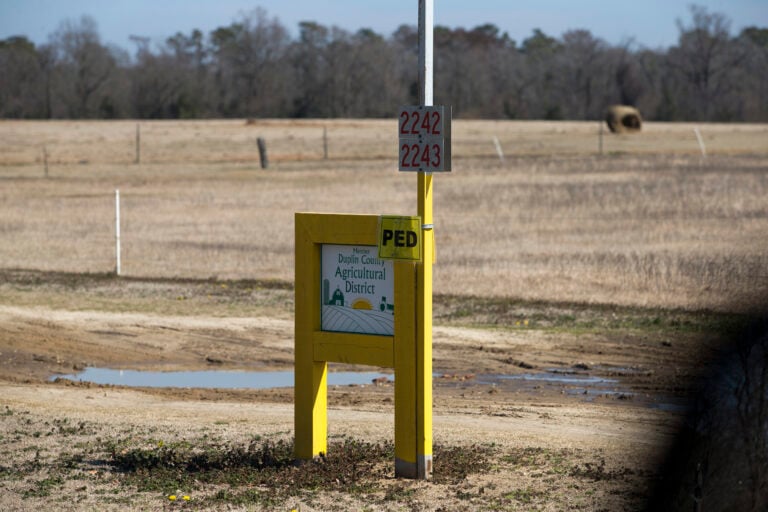On-the-Ground in North Carolina: Fighting for Clean Water and Environmental Justice
By: Waterkeeper Alliance

Waterkeeper Alliance’s Advocacy Director, Jacki Esposito, Pure Farms, Pure Waters Campaign Manager, Patience Burke, and Pure Farms, Pure Waters Coordinator for North Carolina, Larry Baldwin, recently met with local Waterkeepers and community organizations to discuss the pervasive pollution caused by industrial animal agriculture, including Concentrated Animal Feeding Operations (CAFOs), poultry farms, and slaughterhouses. The discussions centered on the significant environmental impact these operations are having on nearby communities.
North Carolina has one of the highest concentrations of hog farming in the United States, with approximately 2,100 hog operations, primarily located in eastern counties like Duplin and Sampson. In addition to the large number of hog operations, North Carolina also has about 4,800 poultry operations.
These operations disproportionately impact fenceline communities—those located in close proximity to industrial facilities—forcing residents to contend with the harmful effects of billions of gallons of hog feces, urine, and poultry waste. This waste is either flushed into open-air lagoons or spread on nearby fields, releasing harmful gases such as ammonia, hydrogen sulfide, and methane into the air. Laden with excess nitrogen, phosphorus, and other pollutants, the waste frequently contaminates nearby groundwater and rivers, threatening vital drinking water sources and the health of local communities.
A Community Under Siege
During the trip, the Waterkeeper Alliance team had the privilege of meeting with local community leaders who shared deeply personal stories about the devastating impact of CAFO pollution on their communities. Residents who live in the heart of hog country have had trouble breathing when they go outside, and sometimes the stench from the hog waste is so bad that having friends and relatives over for outdoor gatherings and picnics has become a thing of the past.
One church in Magnolia, North Carolina, is surrounded by industrial hog operations and spray fields. In 2016, the county tested the water at the church and declared it contaminated due to high levels of nitrate. The county gave the church and its parishioners 90 days to come up with $4,000 to dig a new well, and pay to clean up a mess that they did not create.
Community partners emphasized that water contamination from Smithfield Foods, the largest hog producer in the country and a major employer in the area, has been a part of daily life for decades. A 2018 Duke University School of Medicine study raised alarm about the risks of living or working near industrialized hog operations, finding North Carolinians who live near large hog operations experience higher death rates compared to other residents.
The stories shared by local community members painted a grim picture of environmental racism, where marginalized communities are disproportionately burdened with the harmful consequences of industrial agriculture.
The U.S. Environmental Protection Agency (EPA) exempts industrial animal facilities from monitoring and reporting their toxic air emissions, meaning that communities like those in Duplin and Sampson counties are exposed to pollutants in the air they breathe often without knowing. Waterkeeper Alliance, our members, and local and national partners have been calling on the agency to eliminate this exemption for years.
However, new EPA Administrator Lee Zeldin has been tasked with rolling back protections that cut pollution and has already promised to follow through on that deregulatory agenda. In 2022, Zeldin voted to cut funding for EPA – the agency he is now set to lead – and his track record on the environment does not measure up to the necessary clean air and clean water actions required to fulfill the EPA’s official mission to protect human health and the environment.
Echoes of “The Smell of Money”
Over the past 40 years, corporate greed has driven the expansion of industrialized animal agriculture in North Carolina, often at the expense of public health and environmental integrity. According to the U.S. There are now more than nine million hogs in the state, up from about 2 million in the early 1980s. North Carolina ranks third among all U.S. states in terms of pork production, and a quarter of North Carolina’s pork is sold overseas.
The booming industry is powered by the proliferation of CAFOs in eastern North Carolina, mostly concentrated in Duplin and neighboring Samson counties, where hogs outnumber people by as much as 35 to 1. It’s come at the cost of residents’ health: A Duke University study found that North Carolina communities with hog facilities have a 30% higher mortality rate than the rest of the state. In Duplin County, 89 people die prematurely each year as a result of emissions from hog production. Low-income communities of color in North Carolina reportedly have 10 times the number of CAFOs as wealthier white regions of the state — their quality of life, health, and home values sacrificed for corporate profits.
The Fight for Clean Water and Justice
On the second day of the trip, Waterkeeper Alliance staff sat down for a meeting with North Carolina Waterkeepers to discuss what they’re finding in their watersheds. From factory farm biogas, to inadequate swine and poultry regulations, to sludge application, there is a lot of work to be done to hold the industrial animal agriculture industry accountable for its pollution and implement safer standards to protect North Carolina residents.
Waterkeeper Alliance remains committed to working alongside community-based organizations working to protect North Carolina’s water and advocating for reforms that prioritize North Carolina residents’ public health, civil rights, and access to clean water. By exposing the systemic issues and corporate practices that fuel water pollution, we can build momentum for change. Together, we can create a future where clean water and healthy communities are a reality for all.